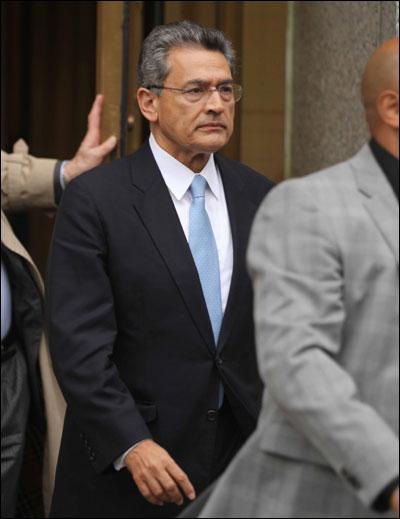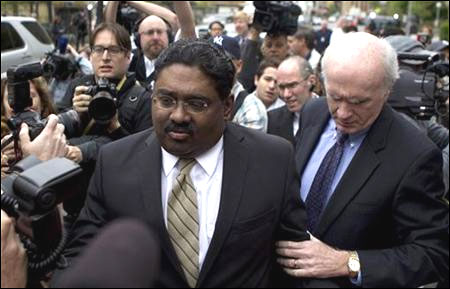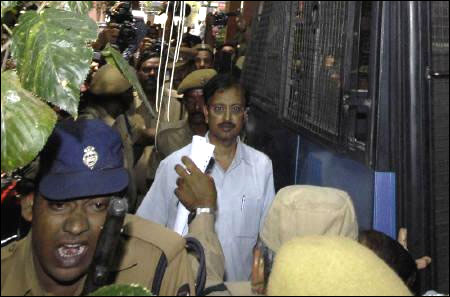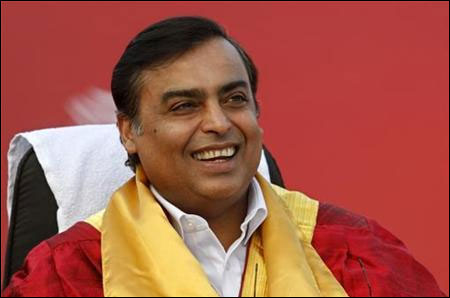Photographs: Paresh Gandhi/Rediff
The two bigger takeaways from this case for Indian regulators and enforcement agencies are the speed and efficiency with which it was concluded.
Much debate can be expected on whether former Goldman Sachs director Rajat Gupta got off too lightly. Many will wonder whether Manhattan US District Judge Jed Rakoff's sentence of two years in prison and a $5-million fine was influenced by Mr Gupta's extensive charitable work, as his experienced lawyer argued.
No doubt the fact that he surrendered, pleaded guilty and did not make money from the insider tips he passed on to his friend, the hedge fund magnate Raj Rajaratnam, also played a part in a crime that could have attracted a prison sentence of 10 years.
Click on NEXT for more...
Lessons that the Rajat Gupta case holds for India
Photographs: Lucas Jackson/Reuters
But the two bigger takeaways from this case for Indian regulators and enforcement agencies are the speed and efficiency with which it was concluded.
Just four years and one month elapsed between the telephonic conversation that took place between Mr Gupta and Mr Rajaratnam and his sentencing on Wednesday.
Click on NEXT for more...
Lessons that the Rajat Gupta case holds for India
Image: Satyam founder Ramalinga Raju.Photographs: Krishnendu Halder/Reuters
Compare this with the long and winding judicial road down which white-collar crime inconclusively meanders in India.
For instance, the case against Harshad Mehta dragged on for nine years until he died in 2001.
The court case against Satyam founder Ramalinga Raju, who confessed to fraud in 2009, is nowhere near completion, although his long imprisonment may be considered punishment enough for fudging the books for several years.
As for insider trading cases, they are notoriously hard to prove almost anywhere in the world.
It is worth noting that the entire basis for the case against Messrs Rajaratnam and Gupta was built on wiretapping operations meticulously planned by the Federal Bureau of Investigation, or FBI (indeed, Mr Gupta's conviction was the result of "collateral damage," the wiretaps on Mr Rajaratnam's phone).
Click on NEXT for more...
Lessons that the Rajat Gupta case holds for India
Photographs: Courtesy, Wikimedia Commons
In India, as in the US, wiretaps can be done by federal law enforcement agencies.
In fact, India has looser checks and balances inasmuch as wiretaps are authorised by the home secretary and, therefore, can be subject to political manipulation; in the US, court authorisation, subject to stringent proof, is required.
It is, however, a commentary on the lack of inter-agency cooperation in government that the Securities and Exchange Board of India (Sebi) is seeking independent powers to tap phones to nail insider trading that it suspects is rampant on the Indian bourses.
These demands stem from a frustrating inability to nail as many cases as it investigates.
Click on NEXT for more...
Lessons that the Rajat Gupta case holds for India
Photographs: Amit Dave/Reuters
Sebi does have, of course, some big-ticket successes to boast in the fines of Rs 25 crore (Rs 250 million) each that were paid by two Reliance companies - Reliance Infrastructure and Reliance Natural Resources - for breaching securities laws.
But in the main, the fines have been paltry - Rs 60 lakh (Rs 6 million) here, Rs 75 lakh (Rs 7.5 million) there - and the decisions nullified by appeals to the Securities Appellate Tribunal.
No one has yet gone to prison for insider trading in India. Much hangs on Sebi's investigations against Reliance Industries for alleged insider trading in 2007.
The fact that Reliance tried to settle this through a consent order is significant. Access to technology may have helped Sebi close this and other cases faster.







article